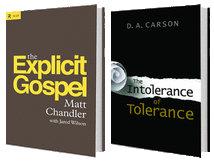
Two books in particular struck me this year. The first a book by Matt Chandler entitled The Explicit Gospel. Although the foundation of his argument won’t be new to most Christians (although he claims it might be), one argument singularly struck a chord within me. Chandler speaks about the gospel. The good news of the gospel, he says, is that humanity has been, by grace, afforded salvation through the sanctifying work of God through Jesus Christ’s death and resurrection. This good news is available to us if we choose to accept it. The juxtaposition which had been lost to me (or perhaps forgotten for a time) was that this good news only finds fruition when contrasted against the bad news. The bad news, he claims, is that without this sacrifice and atonement, and unless we accept it, we are destined to a life apart from God (hell).
This is a concise explication of the gospel story, and said in a way that struck me as profound when I heard it. I hope that it is profound to all of us because I think God intends us to be struck by its profundity.
The second book, which seemed an extension of Chandler’s when I read it, is D.A. Carson’s The Intolerance of Tolerance. In this book, Carson laments the supposed Modern-Post-Modern shift that saw the understanding of, and definition of, tolerance take a drastic turn. In modernity, the assumption was that every person had the right and obligation to fight for the truth of his/her opinions and beliefs in the hope that the truth-cream would rise to the top. What we see happening (or saw happen) in post-modernity is that tolerance has been identified with the belief that all truths are equal and should be relegated to the private sphere. In this view those that claim to hold absolute truth are seen as intolerant. Carson argues quite convincingly that those fighting for this second supposed tolerance are as intolerant as those they are accusing. The new Tolerants believe that people who propose absolute truth in anything are intolerant (anything but science, secularity, and pluralism, of course). Simply believing that another person or group of people are wrong in what they believe is said to be intolerant.
The reading of these two books convinced me that what is required in Christian schools is not a retreat or apology from hard and fast truth claims founded in the Bible and in Christian tradition, but a renewed fervour for ensuring that we are unwavering in our belief that Christianity holds the key to salvation. The logical extension of this is not prejudice, discrimination, and division as some in the public circles would have us believe. In fact, I believe as Carson does, that the new tolerance does more to divide and discriminate than the traditional understanding of tolerance. It seems to me that the new Tolerants are trying to achieve the same goal that they accuse of us: namely the creation of a homogeneous society of unthinking, unfeeling individuals.
If you believe as I do that Christianity and the redeeming power of Christ are integral to the well-being and salvation of individuals, then I think we need to charge ahead, unashamed of the saving message that we have to share. Instead of fearing the offense of others, I think we need to fear that the Good News will not be told. Instead of fearing that if we don’t water down the message our schools will shrink, I think we need to be bold in delivering the message that has transformed our lives, and can transform the lives of others. We need to deliver the explicit gospel knowing full well that to many of those who hear it, it will be intolerable.
Carson, D. A.. The intolerance of tolerance. Grand Rapids, Mich.: William B. Eerdmans Pub., 2012. Print.
Chandler, Matt, and Jared C. Wilson. The explicit Gospel. Wheaton, Ill.: Crossway, 2012. Print.

 RSS Feed
RSS Feed
